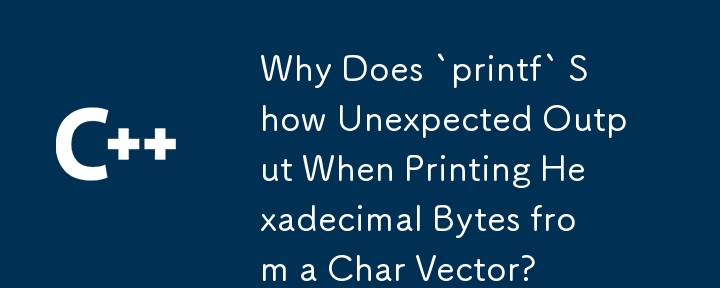Home >Backend Development >C++ >Why Does `printf` Show Unexpected Output When Printing Hexadecimal Bytes from a Char Vector?
Why Does `printf` Show Unexpected Output When Printing Hexadecimal Bytes from a Char Vector?
- Barbara StreisandOriginal
- 2024-12-07 07:04:111078browse

Unexpected Output from printf When Printing Hexadecimal Bytes
When working with a vector of chars (pixel_data), printing a single byte as a hexadecimal value (printf(" 0x%1x ", pixel_data[0])) may unexpectedly produce a four-byte integer (0xfffffff5) instead of the intended value (0xf5).
Cause of the Issue
Printf typically expects an unsigned integer parameter for the %x modifier. However, a char is promoted to an int when passed to a varargs function like printf. This promotion results in the printing of additional bytes.
Resolving the Issue
To ensure predictable results, explicitly cast the char to an unsigned int:
printf(" 0x%1x ", (unsigned)pixel_data[0]);
Considerations for Variable Types
- Define pixel_data as unsigned char to treat the bytes as unsigned values.
- Alternatively, cast to unsigned char within the printf statement:
printf(" 0x%x ", (unsigned)(unsigned char)pixel_data[0]);
- Use a masking operation to zero-extend when converting to unsigned int:
printf(" 0x%x ", (unsigned)pixel_data[0] & 0xffU);
Understanding Field Width
The %1x field width specifies the minimum number of digits to display. However, it has limited usefulness in this context as at least one digit is always needed.
The above is the detailed content of Why Does `printf` Show Unexpected Output When Printing Hexadecimal Bytes from a Char Vector?. For more information, please follow other related articles on the PHP Chinese website!
Related articles
See more- What's the most reliable way to handle Ctrl-C events in C ?
- How Does OpenCV\'s `cvWaitKey()` Function Handle Key Presses and Window Events?
- Why Return a Reference, Not a Value, from a C Copy Assignment Operator?
- How Do Compilers Actually Handle the Unspecified Order of Function Arguments in C ?
- How Can I Efficiently Replace Substrings in C ?

